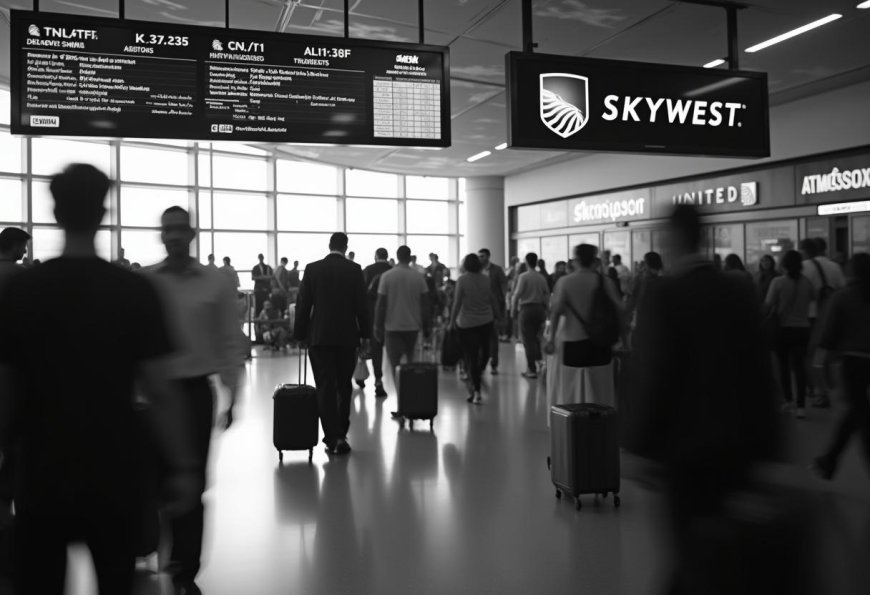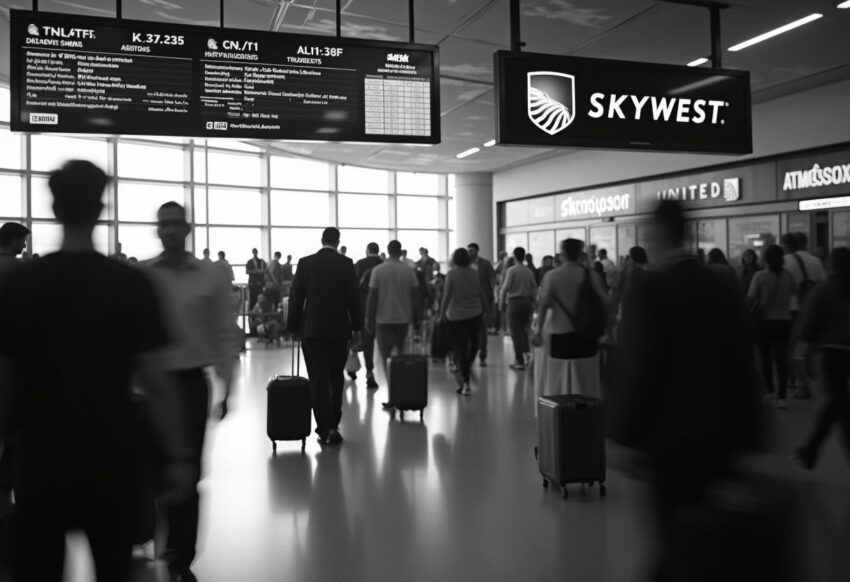Hartsfield Jackson International Faces Over 600 Delays And 80 Cancellations, Disrupting Travel To San Francisco, Seattle, Dallas, Rapid City, Aspen, And Houston


Hartsfield-Jackson International Airport (ATL) in Atlanta, Georgia, has experienced major disruptions today, with 585 delays and 84 cancellations affecting thousands of travelers across the United States. As the busiest airport in the world by passenger traffic, ATL plays a vital role in domestic and international travel. These delays and cancellations have created a lot of stress for passengers heading to cities like San Francisco, Seattle, Dallas, Rapid City, Aspen, Houston, and others. The disruption stems from a mix of weather issues, air traffic problems, and operational challenges. Airlines are having to navigate a very complicated situation during the busy summer travel season.
Airlines Affected by Delays and Cancellations at Hartsfield-Jackson
SkyWest Airlines has been the hardest hit, with 63 cancellations, making up 13% of the total cancellations at ATL. SkyWest also had 161 delayed flights, accounting for 34% of the total delays. This regional airline, which operates under names including Delta Connection, United Express, and American Eagle, has struggled with the number of flight disruptions, making the situation worse at ATL.
United Airlines, which runs a large portion of the flights from Hartsfield-Jackson, had 318 delayed flights, which is a staggering 46% of all delays. Despite the high number of delays, the airline’s cancellations remained low, with just 7 flights canceled, or only 1% of their scheduled flights. United Airlines, like other carriers, has been rebooking affected passengers, but with high demand this summer, finding an alternative flight has been tough for many travelers.
Delta Air Lines, another major carrier at ATL, also faced significant delays. They had 27 delayed flights, representing 40% of their departures. The airline canceled 4 flights today, which is fewer than SkyWest but still affected a large number of passengers. Delta has tried to minimize further delays, but many of its travelers are still stranded at the airport.
Southwest Airlines, another major player at ATL, saw 240 delayed flights. This accounted for 45% of all delays at the airport. However, Southwest kept cancellations low, with only 2 flights canceled, which is relatively stable compared to some smaller airlines. American Airlines also faced disruptions, with 23 delayed flights, which is 46% of their scheduled departures, and 2 cancellations.
Other airlines impacted by the disruptions at ATL included Frontier Airlines, with 65 delayed flights, or 52% of their departures. Alaska Airlines saw a 62% delay rate on 10 of its scheduled flights. Smaller carriers like JetBlue, Icelandair, and Lufthansa reported delays as well, with JetBlue having delays on 4 flights and Lufthansa experiencing delays on 3 flights.
The Impact on Smaller and Regional Airports Across the U.S.
While Hartsfield-Jackson is the center of today’s disruptions, several smaller airports across the United States have also reported significant delays and cancellations. These include Rapid City Regional (RAP), Idaho Falls Regional (IDA), Aspen-Pitkin County (ASE), and Montrose Regional (MTJ). Flight disruptions are common in these places, though generally not as severe as at ATL.
Rapid City Regional, located in South Dakota, faced 3 cancellations, which is 30% of their total flights, and 2 delayed flights. Aspen-Pitkin County Airport in Colorado saw 2 cancellations, accounting for 20% of its scheduled flights. These disruptions affect passengers traveling through regional hubs. Travelers are encouraged to check the status of their flights before going to the airport.
In addition to regional airports, larger hubs like Los Angeles International (LAX) and Seattle-Tacoma International (SEA) experienced moderate delays. For instance, Seattle-Tacoma had a delay rate of 57% on 12 of its scheduled flights. Despite these issues, these airports have generally managed operations better than the chaos at Hartsfield-Jackson.
The Role of Weather and Air Traffic in Delays and Cancellations
The weather has been a major factor in the delays and cancellations at ATL and other U.S. airports. Thunderstorms, high winds, and other weather problems have created slower turnarounds and delays in air traffic control. With summer being peak travel season, airports like Hartsfield-Jackson see more congestion, and when combined with bad weather, it leads to cascading delays and cancellations.
Air traffic management has also caused delays at ATL. The high number of flights, along with limited airspace and staffing issues, has led to slowdowns, especially for connecting flights from regional airports. Additionally, ground operations have been affected, resulting in longer taxi times for departing flights and delays in baggage handling.
Travelers’ Guide to Navigating Disruptions
As disruptions continue at Hartsfield-Jackson International and other airports, travelers should stay informed and prepare for possible delays and cancellations. Here are some helpful tips for managing travel disruptions:
Check Flight Status Regularly: Use airline apps or the airport’s website to monitor real-time updates on flight status. Delays and cancellations can change quickly, so it’s important to stay informed.
Arrive Early: With a high number of passengers, it is wise to arrive earlier than usual, especially during peak hours.
Be Prepared for Long Waits: With delays and cancellations, expect longer wait times at check-in counters and gates. Bring essentials like snacks, entertainment, and phone chargers to make your wait more comfortable.
Rebook or Seek Compensation: If your flight is canceled, airlines usually provide rebooking options. In some cases, they offer vouchers for meals or hotel stays. Contact your airline for help with managing these disruptions.
Conclusion: A Challenging Day for Travelers at ATL
The disruptions at Hartsfield-Jackson International today, with 585 delays and 84 cancellations, highlight the challenges airports and airlines face during busy travel seasons. While airlines are working hard to assist passengers, the sheer number of flights and operational complexities have caused significant delays, especially for travelers going to or from cities like San Francisco, Seattle, and Dallas. Despite these challenges, airport and airline staff are committed to reducing disruptions and ensuring travelers reach their destinations safely.
Travelers are encouraged to remain patient, check for flight updates frequently, and allow extra time at the airport to navigate ongoing disruptions. With these tips and good communication, passengers can better manage the effects of today’s travel disruptions at Hartsfield-Jackson International and beyond.
(Source: Hartsfield-Jackson International Airport, Atlanta, GA, U.S., Federal Aviation Administration, U.S. Department of Transportation)
The post Hartsfield Jackson International Faces Over 600 Delays And 80 Cancellations, Disrupting Travel To San Francisco, Seattle, Dallas, Rapid City, Aspen, And Houston appeared first on Travel And Tour World.






